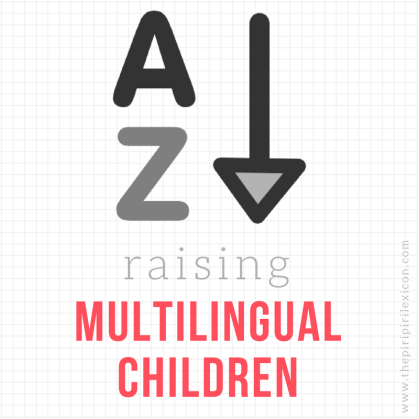Can monolingual parents have bilingual children? This is not about genetics – even if it sounds like it – but I may answer this question with: no.
When I started holding workshops on “Parenting the Bilingual Child”, I had to explain to some of my native English speaking friends, that their children were bilingual even if they didn’t grow up with multiple languages from day one and even if they weren’t fluent in the other language. Most of the parents were even bilinguals themselves without knowing it!
What is a monolingual anyway?
I have spent a lot of time proving to parents and teachers that monolinguals are a minority in our increasingly global world and that bilinguals outnumber monolinguals. – Everyone gets in contact with another language at some point: during travels, when interacting with tourists, talking with international friends etc.. We always pick up some sentences, try to understand the other language.
The simple act of trying to understand another language is the first step of becoming bilingual.
Acquiring some kind of knowledge in another language suffices to not be monolingual anymore!
Being exclusively monolingual parents, living in a constantly monolingual context is almost impossible. Especially if we also count dialects as languages. – I use François Grosjean‘s definition of a bilingual:
“Bilinguals are those who use two or more languages (or dialects) in their everyday lives”
Please note that there is no mention of when the other language is acquired or learned, nor does the level of proficiency play any role in defining a bilingual anymore! This was only the case in some early studies about bilingualism, but since the last 20 years, linguists who are studying bilingualism are way beyond this initial stage – and it is about time we move on!
According to Grosjean’s definition of a bilingual, we can define a monolingual as follows:
“Monolinguals are those who use only one language (or dialect) in their everyday lives”.
If you can genuinely say that you only use, listen to, understand one language – in this case here, English – then you are a monolingual. If you are a native (English) speaker and understand any other language or dialect, then you are not a monolingual.
And if you are not a native English speaker and read this: you have already proven by understanding this text, that you have a good proficiency in the English language, hence, you are bilingual!
Being exposed to only one language is almost impossible nowadays. Only in some remote rural areas, with no or only national TV and radio channels this can still be the case.
But as soon as we move away from these strictly monolingual environments we will get in contact with other languages, either passively or actively.
The monolingual parent
Let’s play with the scenario of a monolingual parent that speaks (writes, reads) one language fluently, and has only a basic understanding of the other language (i.e. has more a passive understanding of it) – hence defines himself as “monolingual” and is not confident enough in this other language to teach it to the child. – What can this “monolingual” parent do to ensure his child becomes bilingual?
I mentioned several strategies monolingual families can adopt if they want their child to acquire or learn another language in my post Monolingual Parents and Bilingual Children.
As a language consultant and expert in bilingualism and language acquisition, I usually submit a questionnaire to my clients to find out what their language situation and short and longterm goals are. – These are only three basic questions I usually ask:
1) Why do you want your child to learn the other language?
I have seen many parents impose languages on their children that they didn’t need and didn’t want to learn, with different results, but mainly negative outcomes on the long run (with children refusing to talk the other languages or developing a resistance in learning a language only because their parents wanted them to).
If there is a real need for the child to learn the other language, either because they live in the country where the language is spoken or they are about to move there, or the child needs to attend school in that language, or family members speak this language: the attempt has more chances to be successful.
2) How proficient does your child need to be(come) in the other language?
If the child needs to attend school in this language, then the goal of a nearly native level is clear. If a basic understanding and basic reading and writing skills are enough, the methods and strategies will be slightly different; and they also depend on the age of the child, of course.
3) Who will talk the other language with your child on a regular basis?
When it comes to learn another language, consistency and regular input are the key.
If the other language is the local language and school language, your child has a good chance to acquire the language quickly and in the most natural way thanks to regular interactions with locals.
If the other language is a foreign language, some parents opt for a nanny or aupair when the children are still very young.
I had clients who would hire an aupair to talk the other language with their children – but aupairs usually have one year contracts. – Can you make sure that there will be other aupairs who will be equally engaged to provide valuable linguistic input for your child? If not, what is your plan B? Is there a local community that speaks the other language? Or can you ensure that your child will have the opportunity to fully immerse in the other language regularly (during holidays for example)?
Monolingual parents who want to raise their children bilingually but are not able to support this at home, need to reach out for help and provide a regular input from someone else. It is advisable to provide this regular and consistent input from a person that interacts, converses with the child in an engaging way (i.e. not giving orders or “teaching”).
No matter how old the child is: if there is a need to talk the language and if the interaction is fun and interesting for the child, the child will be more prone to acquire/learn the language.
Many parents – not only monolingual parents! – tend to prefer help outside of their family. They look for groups who talk the other language, a nanny or an aupair.
If a monolingual parent wants to make sure that the child acquires or learns another language, the first tip I always give is to learn the other language alongside your child!
Parents parents who decide to introduce the other language into their daily life and speak the other language to the child at home too, face the problem of time: when and how can they talk this other language with their child as OPOL is the most suggested strategy and one parent “is supposed” to only talk one language to the child? Choosing the Time and Place strategy is a great option and can be introduced at any stage. This is also a valuable solution for single parents who want to speak more than one language to their child.
Learning the other language alongside your child is a great solution and it’s not only fun for the child: there is nothing that raises a child’s confidence more than to teach a parent something new!
I have very fond memories from learning Dutch alongside my son. When he corrected my pronunciation and taught me new songs, I couldn’t but notice how proud he was that he had the opportunity to teach his mother, this adult who seems to know it all, something new. – It is a great opportunity to have a meaningful connection with the child and the outcome has a very good chance to be positive on many levels!
The title of this post is “Monolingual Parents and Bilingual Children?” asking if a monolingual parent can have a bilingual child: my answer is of course “YES!”. This has nothing to do with genetics…
An initially monolingual parent will become bilingual eventually, for the sake of his/her bilingual child.
Please find my services as a family language consultant, other posts about bilingualism on my other blog, or mail me at at info@UtesInternationalLounge.com.
This month bloggers from all around the world are coming together to write about the “A to Z of Raising Multilingual Children.” This series is full of tips, insights, strategies, challenges and stories from parents who are raising bilingual or multilingual children around the world. Expatsincebirth is honoured to be covering M for “Monolingual Parents and Bilingual Children?”as part of this effort. Don’t miss this wonderful series all throughout February here on the The Piri Piri Lexicon.
Categories: Being multilingual, Bilingualism, Multilingual children






